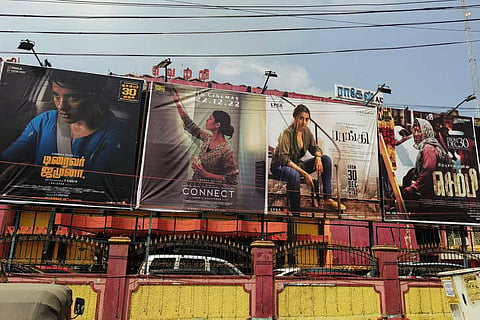

The sight of large banners, posters, and life-size cutouts being placed outside cinema halls have always brought joy to movie buffs. In addition to functioning as advertisement, it speaks to the fan-following and power that celebrities hold. In what was perhaps a first for Tamil cinema, the banners placed outside well-known cinema halls across Chennai last week featured only women actors as all the major releases of the week were women-led films.
The posters lining the entrance of Vettri Theatres in Chrompet — Trisha’s Raangi, Kovai Sarala’s Sembi, Aishwarya Rajesh’s Driver Jamuna and Nayanthara-starrer Connect — were highlighted by a social media user on January 2. The first three films hit the big screens on December 30, while Nayanthara’s horror flick Connect had its theatrical release in the week before. The possibility of only women-led films releasing over a festival weekend has been an anomaly for long. The space is usually reserved for commercial entertainers headlined by male stars.
The tweet by Chennai-resident Deepan Qweeter Kannan on January 2 garnered the attention of many on social media and sparked a discussion on how this would have been unimaginable, say, 10 years ago. The tweet was reshared by Aishwarya Rajesh, who played the titular role in Driver Jamuna, and actor Samantha Ruth Prabhu, who played the eponymous lead in her recent outing Yashoda. Many other users also posted comments noting that it is a welcome departure and they would like to see more films with women actors in the lead. “As a long time resident of this area, I don't think I have ever seen something like this before. Thanks for noticing it. Makes me very happy,” one of the responses to Deepan’s tweet read.
Passing by the Vettri theatre in Chromepet, my sister and I realised it had the banners of all the movies with a woman lead. What a long way Tamil cinema has come! 10 years back this would have been unimaginable. pic.twitter.com/IEh5ioeKsh
— Deepan Qweeter Kannan (@kannandeepan) January 2, 2023
— Samantha (@Samanthaprabhu2) January 2, 2023
Women Rising!! https://t.co/qR3N3OozK8
Granted that not all the films released during the weekend have opened to critical acclaim or positive responses from fans, there is no denying the fact that women-led films are no longer the exception, but have become the norm. This change, however, is in no way a sudden one. For years, if not decades, women actors have been demanding that better roles be written for them. This tangible shift as well as acceptance from audiences has come after years of experimentation with women-centric cinema — some films that have struck gold at the box office and some that have flunked. Women technicians in cinema have also consistently spoken about the need to have more women behind the lens to subvert the male gaze in films. The past decade has also seen the making of multiple women stars such as Nayanthara, who is fondly known as ‘Lady Superstar’ among her fans and Manju Warrier in Mollywood, who, like her male counterparts, has a fan-club to her name.
The advent of over-the-top (OTT) platforms, and formula films flunking at the box-office, have also fueled this change. Many actors like Nithya Menen, Nayanthara, Parvathy, Rima Kallingal, Aishwarya Lekshmi, Trisha, Aishwarya Rajesh, Rajisha Vijayan, and Jyothika, among others, have made carefully calibrated choices in order to support women-centric cinema.
This has also been the case with the actors starring in lead roles in the aforementioned films. Nayanthara, who made her debut in the 2003 Malayalam film Manassinakkare, started focusing on signing women-centric films after 2010 after featuring in a number of commercial entertainers. In a recent interview, the actor said, “When I started the second set of films, I had a few dreams. Women-centric roles were not being offered. I used to wonder why heroines don’t have any importance. At the time, even when we attended an audio launch event, we would stand in some corner and the things they say would be random. We were not important in any sense. That was the reason why I avoided going to such events,” she said, adding that she is currently working on pitching large-scale women-centric films. Driver Jamuna-actor Aishwarya Rajesh, while speaking at an award function, thanked Nayanthara for establishing that women-centric films can be commercially viable.
Speaking about her film Raangi, Trisha said in a pre-release press interaction that women gaining importance in the film industry is a significant step. “What matters is that audiences appreciate films with good content, regardless of whether they are led by a male or female actor,” she said. Comedian Kovai Sarala, who was seen in a full-length role in a social drama for the first time in Sembi, spoke about not being able to find roles written for older women actors in an interview with The Hindu. She also said that she misses working with directors who were her frequent collaborators in the past.
Notably, Driver Jamuna, Raangi, Connect, and Sembi, as well as other recently released films like Gatta Kusthi, Yashoda, and the Malayalam film Jaya Jaya Jaya Jaya Hey, have featured women in action roles, which have traditionally starred the male leads in cinema. Like in 2021, a number of other films led by women, including Sai Pallavi’s Gargi and Shraddha Srinath and Rohini starrer Witness, left a mark in the past year. The release of these films as well as the acceptance from audiences signal that the trend of women actors headlining big-budget films is here to stay.